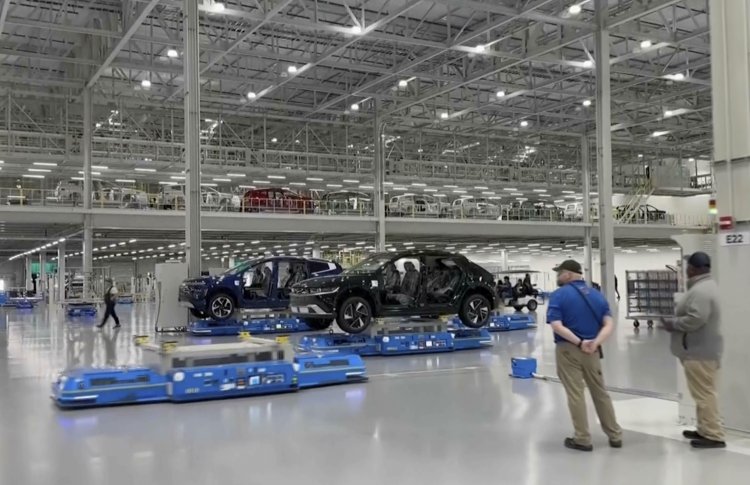The Overlooked Victim of Trump's Auto Tariffs: Domestic EV Production
The president's recently announced tariffs on imported vehicles, along with his intention to eliminate a widely appreciated tax credit, are expected to significantly diminish demand for vehicles produced by American workers.

Trump has expressed that he is not worried about rising prices, arguing that the tariffs are justified to bolster American manufacturing. However, one of the lesser-known implications of these tariffs is the detrimental impact they may have on the domestic auto industry’s rapidly expanding sector: electric vehicles (EVs).
According to Cox Automotive, sales of EVs rose by 7 percent last year, driven by former President Joe Biden’s policies and an influx of new models, generating jobs in rural red districts throughout the South and Midwest. Despite this growth, Trump is not supportive of the shift towards electric vehicles, referring to it as a “transition to hell.” He has pledged to reverse Biden’s signature Inflation Reduction Act. Additionally, alongside the import tariffs, he has threatened to eliminate the tax credit available to EV buyers, which could significantly decrease demand for electric vehicles and, consequently, the jobs associated with them.
Many new auto plants being established in the U.S. are focused on manufacturing EVs. One might assume that the electric vehicle sector should benefit from Trump’s “America first” policies. However, the intricacies of the auto industry may lead to unintended consequences. A significant portion of the fundamental materials required for EV batteries is sourced from China, which is affected by the tariffs. This reliance on imported materials increases the cost of EVs.
Nevertheless, there are automakers that stand to benefit, particularly Tesla. Tesla has prioritized domestic sourcing and assembled all of the more than 600,000 Teslas sold in the U.S. last year in California or Texas. Unlike many other manufacturers, Tesla produces a larger share of its components, such as motors and seats, within the U.S., which mitigates the impact of the tariffs. While Tesla CEO Elon Musk acknowledges that the tariffs will have a “not trivial” impact on the company, its higher level of domestic content means that Tesla will incur lower tariffs.
As for whether Trump’s tariffs are intended to benefit Musk, it seems unlikely. Trump has favored high tariffs for decades, long before Musk and Trump became friends. Their alignment in this instance appears to be coincidental.
Additionally, Hyundai may also be well-positioned to navigate the situation. The company is taking steps to align itself with Trump’s agenda, as evidenced by its chairman, Euisun Chung, appearing with the president at the White House to announce $21 billion in new U.S. investment. Coincidentally, Hyundai opened a new, large EV plant in Georgia on the same day Trump announced the tariffs. This timing creates an impression of compliance with Trump’s policies, but Hyundai's expansion in the U.S. is largely attributed to Biden’s initiatives, specifically the assumptions tied to the Inflation Reduction Act.
A significant variable affecting the future of the Hyundai plant and other EV and battery factories is whether Trump proceeds with eliminating the $7,500 tax credit for EV buyers. Critics, including Trump and many Republicans, argue that such subsidies unfairly favor certain market players. However, the tax credit was designed to encourage EV and battery manufacturing in the U.S., requiring automakers to gradually increase the share of domestic content sourced from the U.S. or allied nations to qualify.
Trump’s longstanding aversion to electric vehicles raises questions about his motivations for eliminating the tax credit. Although he made a notable effort to purchase a Tesla from Musk, he has generally focused on praising Musk while downplaying the significance of the vehicle itself. Some Republicans have identified the EV tax credit as a possible source of funding for a proposed Trump income tax cut, which could be significant as a Harvard study estimates that its removal could save the government $168 billion over a decade.
The consequence of removing the tax credit, which is commonly utilized by EV buyers, could result in a substantial downturn for the EV industry, leading to economic disarray in numerous red-leaning districts across the nation.
Princeton University conducted a study projecting that if the EV tax credit is eliminated, new EV and battery factories scheduled to open in 2026 or later may no longer be necessary due to insufficient EV demand. Such developments have caught the attention of Republican members of Congress, as many planned EV and battery supply-chain factories are located in their districts, particularly in rural or suburban areas of the Midwest or Southeast. With 228 projects in the pipeline aimed at creating 118,000 jobs focused on the battery supply chain, Republicans are now reconsidering the immediate abolition of the EV tax credit and may instead opt for a phased approach, hoping to preserve the thousands of jobs that might be generated.
Sanya Singh for TROIB News
Find more stories on Business, Economy and Finance in TROIB business












